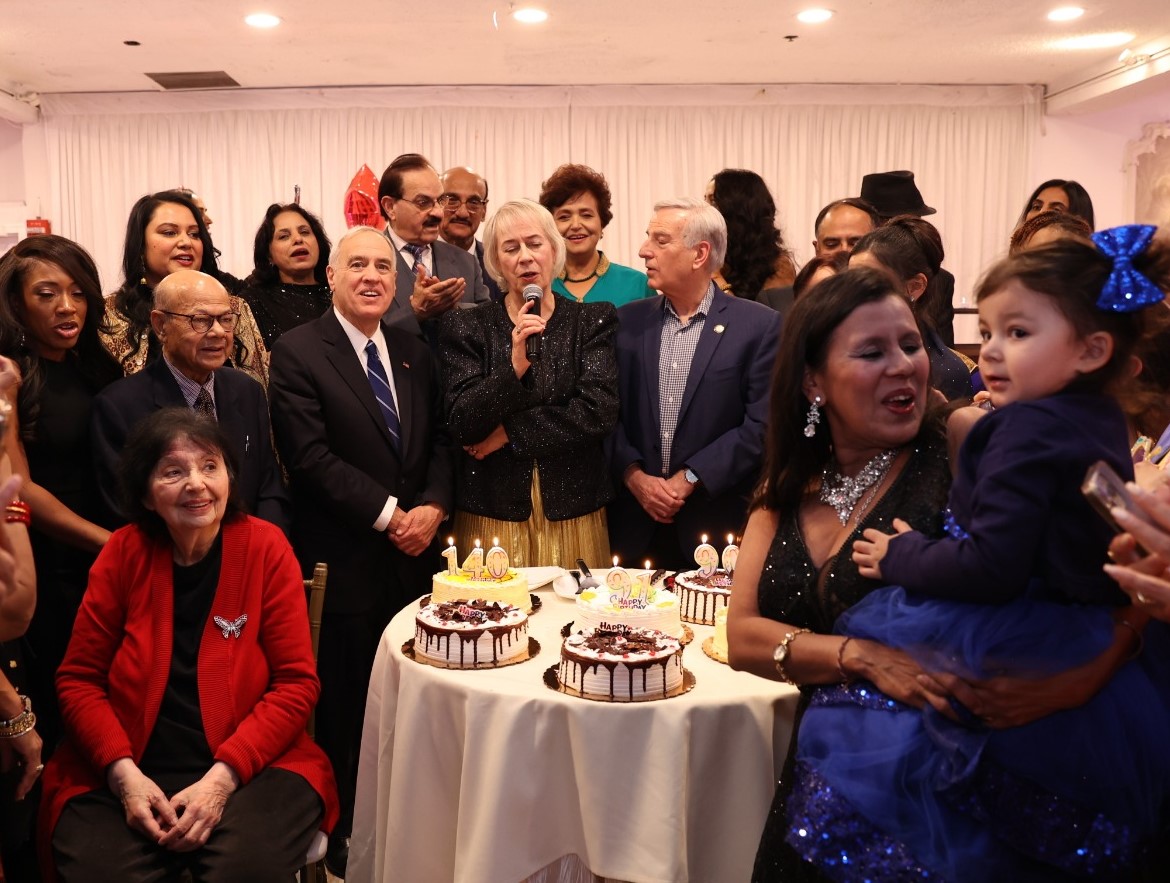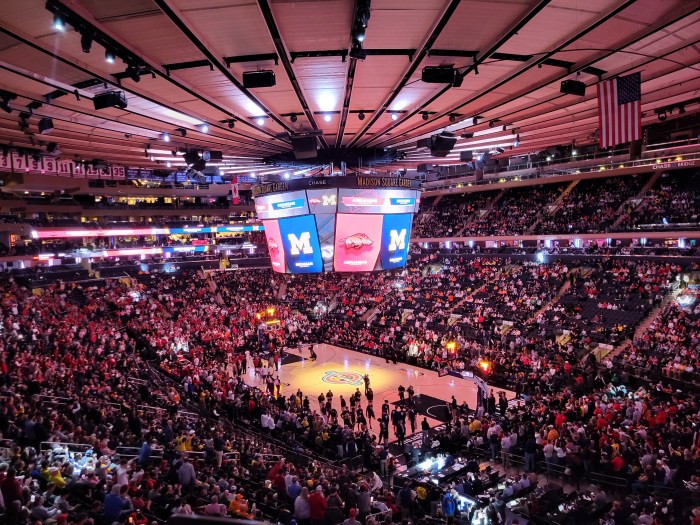Brooklyn comedian Hari Kondabolu will be headlining six shows in Manhattan this week, but his heart still lies in his home borough of Queens.
“I romanticize Jackson Heights the way other South Asians my age, I think, romanticize India or Pakistan,” the 34-year-old says. He lived in Jackson Heights until 1991, before his family moved to Floral Park and later Jamaica.
“To me Jackson Heights was this really special stage — this is where the story begins, kind of feeling,” he says. “And also there’s no other place quite like it, even though it’s only a few blocks. Little India is only a few blocks.”
The funnyman, who is setting up shop at Carolines starting Thursday, has built his comedy brand on politics, certainly a good business to be in these days. He’s the co-host of the podcast “Politically Re-Active” with W. Kamau Bell, and he’s working on a documentary “The Problem with Apu,” about “The Simpsons” character.
amNewYork spoke with Kondabolu about some of his favorite Queens spots as well as his comedy.
How did your Queens upbringing inform you as a comic and adult?
Well, I was sheltered by diversity, you know what I mean? Like diversity wasn’t a real concept to me until college. Because if you grow up with it, it’s not a thing, it’s just the way life is. So I think I was sheltered by it. I don’t think I realized the rest of the country wasn’t like Queens. That there are people from all over the world and their kids there. The only clues I ever had was when I watched television and I was like, “Wait, where are we? Where are all my friends? Something is off here.” But, yeah, I mean you grow up with a confidence that you fit in — it’s not to say that I was not aware of racism or that I wasn’t aware of inequality or that I didn’t get picked on. It’s not to say that. But like I belonged here. There was that feeling and then once you leave it, you realize that, “Wow, this is not that way it is.” I think I probably reflect a lot of what I talk about in my act. Because I went to college in Maine. If you start in Queens and then you go to college in Maine, your brain is completely fried.
Yeah, that is a whole different world up there.
That’s when I realized I was sheltered. You don’t think you are sheltered in New York. But you are. You just are sheltered by different things. So I think that kind of dissonance of from here to there and how different everything was, I started to realize like who I really was and sometimes you can’t really realize who you are until you leave where you grow up. That way you can actually see the comparisons and see what sticks to you. What are the values that are so deep that I will fight for them, I will talk about them.
What are some of your favorite places to eat in Queens?
There’s a place called SriPraPhai (64-13 39th Ave., Woodside). I always mispronounce it . . . That place is unbelievable, like, my God, it’s the best Thai food I’ve ever eaten. When they say there’s a dish that’s spicy, that means don’t get it. It means it’s not a joke. It’s not like, “Oh, American spicy.” No! I think my mom got the Jungle Curry for her birthday. She wasn’t able to taste the rest of the meal. The next three days were pain. That place is incredible. The food is amazing.
It’s not like super fancy, which is something I like about Queens’ restaurants. They’re not showy, you know what I mean? They’re just good food. You don’t need to pay 25 or 30 extra dollars per person for ambience. It’s just great food. I also love the Temple Canteen (45-57 Bowne St., Flushing) or the Dosa Hutt (45-63 Bowne St., Flushing). . . . It’s funny that in Brooklyn you pay like $12 or $14 for dosa and you can get it for $2 or $4 in Queens because it’s not a fancy dish; dosa are supposed to be made cheaply and easily and quickly. . . . The only other place I’ll probably mention, too, is Jackson Diner (37-47 74th St., Jackson Heights). It’s standard. I realize it’s not what it used to be, but it’s still great brunch.
What about for sweets?
I like Rajbhog (72-27 37th Ave., Jackson Heights) a lot, man. That’s like the standard here. There’s also another place that I love called Al Naimat Restaurant & Sweets (37-03 74th St., Jackson Heights). I love the chai there.
Are there comedy clubs in Queens that you cut your teeth at as a young comedian?
No, honestly. In Queens, at the time, there weren’t really clubs that I knew of. I started in high school. I went to Maine. I did comedy in college. When I came back from breaks, I would always go into the city, sometimes even Brooklyn to try to get spots. But Queens didn’t have anything back then. Now it’s different. Now there’s this great club called Q.E.D. (27-16 23rd Ave., Astoria) [and] the Creek and the Cave (10-93 Jackson Ave.) in Long Island City.
What projects do you have going on?
We’re into “Politically Re-Active” season two with me and my friend, W. Kamau Bell. It’s a great podcast. We interview various politicians or — not really politicians, it’s more like people who analyze various aspects of politics and social issues. We had an episode about gerrymandering last year. We talked a lot about voter suppression. We talked a lot about different communities. How different communities are affected by various policies. The first season was focused on the election and the second season is more focused on, OK Trump is in office. What are the variables? What does the country look like and what issues are still important?
I think a lot of people have gotten politically active with the Trump election, but it’s not to say any of these issues are new. People just recognized them now because they’re scared. But before that, the stuff was there. The show really is about talking about the things that maybe we’ve perhaps ignored or perhaps we’ve heard of and don’t know much about. And we try to do that in as funny and in as informative a way as possible.
And you have a new album as well?
I have “Mainstream American Comic” released last year by Kill Rock Stars and that’s my last proper album. The material that’s been carefully curated and worked on.
And then recently I’ve released, I mean, it’s kind of a half album to be honest, but it’s something called “Hari Kondabolu’s New Material Night Volume One.”
I do these new material nights in Seattle, where I do an hour of new material and I work it out. I had this one recording four or five years ago that I did in San Francisco. It’s not well recorded. It’s not polished material. But I like the fact that it’s really raw and it’s honest. You’re not seeing a comedian at his best. You’re seeing a comedian work through his material and having really spontaneous moments. It’s an honest example of how this works. And so I wanted to release that myself because it’s an iPhone recording. But people seem to really like it and I’m surprised that, despite the fact that there’s no press, it’s still been in the top 15 on the Billboard comedy charts for the last three weeks. For an iPhone recording.
How is your documentary going?
I have this documentary that I made about Apu from “The Simpsons” called “The Problem With Apu.” I made it for TruTV and it should be out on Tru hopefully later this year. And that’s in the final editing stages. So that’s pretty exciting.
What is that about?
I mean it kind of speaks to what I was saying earlier about how I grew up. I grew up in this really diverse place in Queens with so many South Asians. When I watch television, it’s like we didn’t exist. “The Simpsons” was my favorite TV show, and yet even in my favorite TV show, we had Apu, who was the only character we really had on television and he was this stereotype voiced by a white guy. It was this kind of weird, how do I love this show so much even though it makes me feel terrible? This is the source of me getting picked on. . . . The documentary is really about why representation is important in the media and how it can look and how it has looked in the past. . . . The film is a look at a character. It’s a look at a community and it’s a look at a broader issue like representation in America.
Have you seen improvement?
Absolutely. And I think comedy is a great example. . . . With comedy, if you get a shot and you’re up there, you control your fate to some degree. I’m not reading something someone gave me. It’s my script. I created it. You see the number of standups that are South Asian that have come up in the last few years whether it’s Aziz [Ansari] or Mindy [Kaling] also being really successful . . . there’s all these different people who did not exist when I was younger, and the fact that they do exist, that they get work — that they’re recognizable pretty instantly to a lot of people, that’s huge! The fact that I get to headline Carolines for a week. . . . I never saw a brown person onstage, anywhere, open mics, anywhere. And now, all of a sudden, I’m headlining the biggest club in New York. That’s clearly progress.
If you go
Hari Kondabolu is at Carolines Thursday through Sunday. Thurs. & Sun., 7:30 p.m., Fri. & Sat., 7:30 & 10 p.m., 1626 Broadway, carolines.com, $32.75-$35


































